专四虚拟语气总结(打印)
- 格式:doc
- 大小:115.50 KB
- 文档页数:8
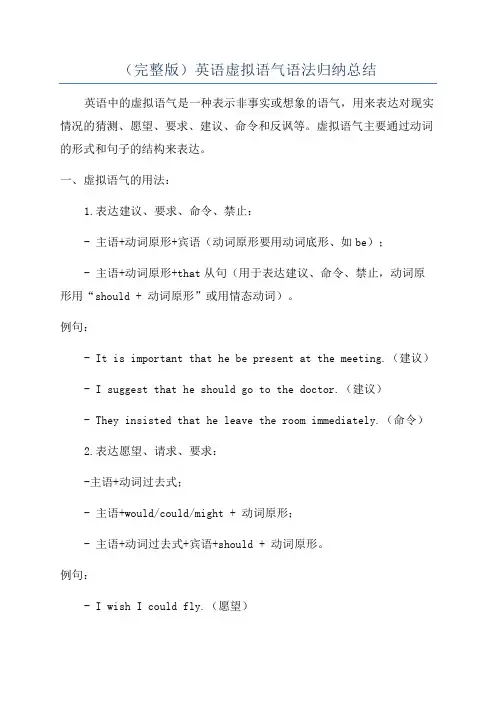
(完整版)英语虚拟语气语法归纳总结英语中的虚拟语气是一种表示非事实或想象的语气,用来表达对现实情况的猜测、愿望、要求、建议、命令和反讽等。
虚拟语气主要通过动词的形式和句子的结构来表达。
一、虚拟语气的用法:1.表达建议、要求、命令、禁止:- 主语+动词原形+宾语(动词原形要用动词底形、如be);- 主语+动词原形+that从句(用于表达建议、命令、禁止,动词原形用“should + 动词原形”或用情态动词)。
例句:- It is important that he be present at the meeting.(建议)- I suggest that he should go to the doctor.(建议)- They insisted that he leave the room immediately.(命令)2.表达愿望、请求、要求:-主语+动词过去式;- 主语+would/could/might + 动词原形;- 主语+动词过去式+宾语+should + 动词原形。
例句:- I wish I could fly.(愿望)- I would appreciate it if you could help me.(请求)3.表示虚拟条件:- If条件从句中的谓语动词用过去完成时,主句用would/should/might/could + have + 过去分词;- If条件从句中的谓语动词用过去时,主句用would/should/could + 动词原形。
例句:- If I had known his phone number, I would have called him.(虚拟条件)- If you had listened to me, we could have finished the project earlier.(虚拟条件)4.表达建议、要求、祝愿:- If only内部称述 + 主语 + 过去式。
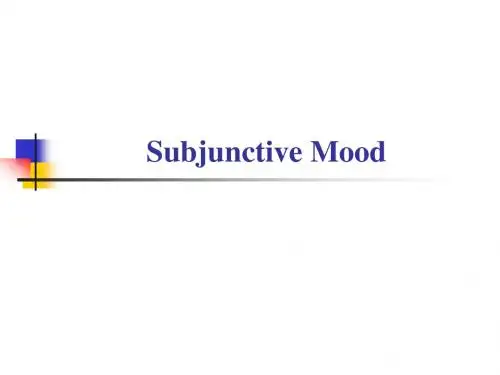
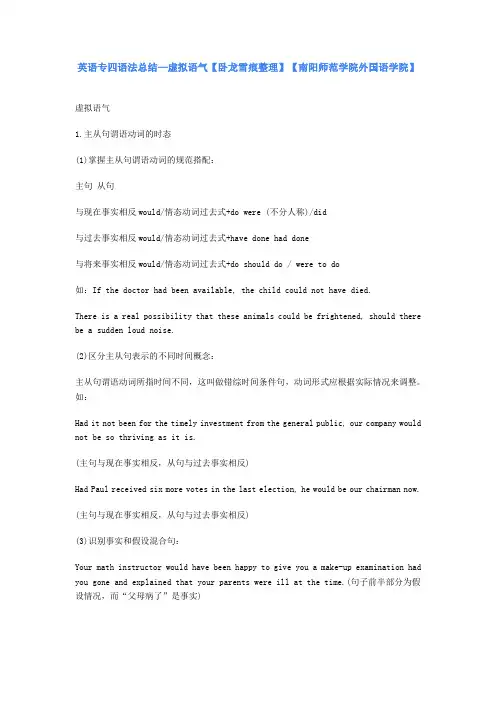
英语专四语法总结—虚拟语气【卧龙雪痕整理】【南阳师范学院外国语学院】虚拟语气1.主从句谓语动词的时态(1)掌握主从句谓语动词的规范搭配:主句从句与现在事实相反would/情态动词过去式+do were (不分人称)/did与过去事实相反would/情态动词过去式+have done had done与将来事实相反would/情态动词过去式+do should do / were to do如:If the doctor had been available, the child could not have died.There is a real possibility that these animals could be frightened, should there be a sudden loud noise.(2)区分主从句表示的不同时间概念:主从句谓语动词所指时间不同,这叫做错综时间条件句,动词形式应根据实际情况来调整。
如:Had it not been for the timely investment from the general public, our company would not be so thriving as it is.(主句与现在事实相反,从句与过去事实相反)Had Paul received six more votes in the last election, he would be our chairman now.(主句与现在事实相反,从句与过去事实相反)(3)识别事实和假设混合句:Your math instructor would have been happy to give you a make-up examination had you gone and explained that your parents were ill at the time.(句子前半部分为假设情况,而“父母病了”是事实)I would have gone to visit him in the hospital had it been at all possible, but I was fully occupied the whole of last week.前半部分为假设,后半部分是事实)2.名词性从句的虚拟形式名词性从句是指宾语从句、主语从句、表语从句和同位语从句。
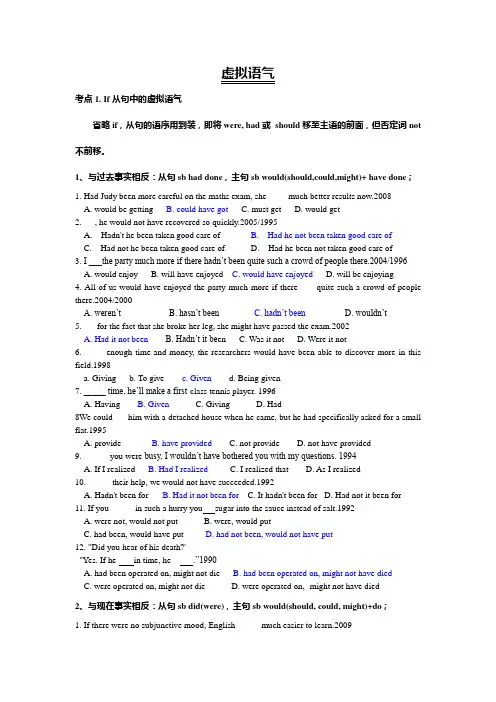
虚拟语气考点1. If从句中的虚拟语气省略if,从句的语序用到装,即将were, had或should移至主语的前面,但否定词not 不前移。
1、与过去事实相反:从句sb had done,主句sb would(should,could,might)+ have done;1. Had Judy been more careful on the maths exam, she ____ much better results now.2008A. would be gettingB. could have gotC. must getD. would get2.___, he would not have recovered so quickly.2005/1995A. Hadn't he been taken good care ofB. Had he not been taken good care ofC. Had not he been taken good care ofD. Had he been not taken good care of3. I ___the party much more if there hadn’t been quite such a crowd of people there.2004/1996A. would enjoyB. will have enjoyedC. would have enjoyedD. will be enjoying4. All of us would have enjoyed the party much more if there ___ quite such a crowd of people there.2004/2000A. weren’tB. hasn’t beenC. hadn’t beenD. wouldn’t5. ___for the fact that she broke her leg, she might have passed the exam.2002A. Had it not beenB. Hadn’t it be enC. Was it notD. Were it not6. _____enough time and money, the researchers would have been able to discover more in this field.1998a. Givingb. To givec. Givend. Being given7. _____ time, he’ll make a first-class tennis player. 1996A. HavingB. GivenC. GivingD. Had8We could ___him with a detached house when he came, but he had specifically asked for a small flat.1995A. provideB. have providedC. not provideD. not have provided9. ______you were busy, I wouldn’t have bothered you with my questions. 1994A. If I realizedB. Had I realizedC. I realized thatD. As I realized10. _____ their help, we would not have succeeded.1992A. Hadn't been forB. Had it not been forC. It hadn't been forD. Had not it been for11. If you _____ in such a hurry you sugar into the sauce instead of salt.1992A. were not, would not putB. were, would putC. had been, would have putD. had not been, would not have put12. "Did you hear of his death?'"Yes. If he ___ in time, he ___.”1990A. had been operated on, might not dieB. had been operated on, might not have diedC. were operated on, might not dieD. were operated on,- might not have died2、与现在事实相反:从句sb did(were),主句sb would(should, could, might)+do;1. If there were no subjunctive mood, English _____ much easier to learn.2009A. could have beenB. would beC. will beD. would have been2. “You ______ borrow my notes provided you take care of them,” I told my friend. 2007A. couldB. shouldC. mustD. can3. If you explained the situation to your solicitor, he ________ able to advise you much better thanI can.2005A. would beB. will have beenC. wasD. Were4. If I knew Japanese , I ______ for the position.1991A. would applyB. will applyC. may have appliedD. will have applied3、与将来事实相反:从句sb did (should+do或were+to do),主句sb would (should, could, might)+do。
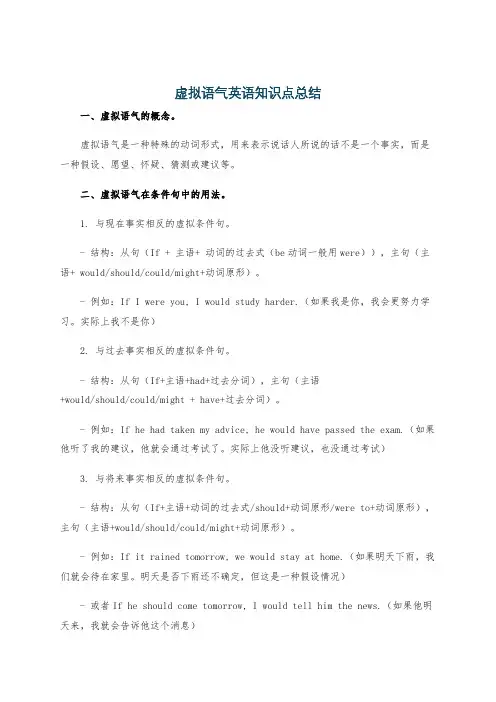
虚拟语气英语知识点总结一、虚拟语气的概念。
虚拟语气是一种特殊的动词形式,用来表示说话人所说的话不是一个事实,而是一种假设、愿望、怀疑、猜测或建议等。
二、虚拟语气在条件句中的用法。
1. 与现在事实相反的虚拟条件句。
- 结构:从句(If + 主语+ 动词的过去式(be动词一般用were)),主句(主语+ would/should/could/might+动词原形)。
- 例如:If I were you, I would study harder.(如果我是你,我会更努力学习。
实际上我不是你)2. 与过去事实相反的虚拟条件句。
- 结构:从句(If+主语+had+过去分词),主句(主语+would/should/could/might + have+过去分词)。
- 例如:If he had taken my advice, he would have passed the exam.(如果他听了我的建议,他就会通过考试了。
实际上他没听建议,也没通过考试)3. 与将来事实相反的虚拟条件句。
- 结构:从句(If+主语+动词的过去式/should+动词原形/were to+动词原形),主句(主语+would/should/could/might+动词原形)。
- 例如:If it rained tomorrow, we would stay at home.(如果明天下雨,我们就会待在家里。
明天是否下雨还不确定,但这是一种假设情况)- 或者If he should come tomorrow, I would tell him the news.(如果他明天来,我就会告诉他这个消息)- 以及If I were to see her tomorrow, I would give her the book.(如果我明天见到她,我就会把书给她)三、虚拟语气在宾语从句中的用法。
1. wish后的宾语从句。
- 表示与现在事实相反的愿望,从句谓语动词用过去式(be动词用were)。
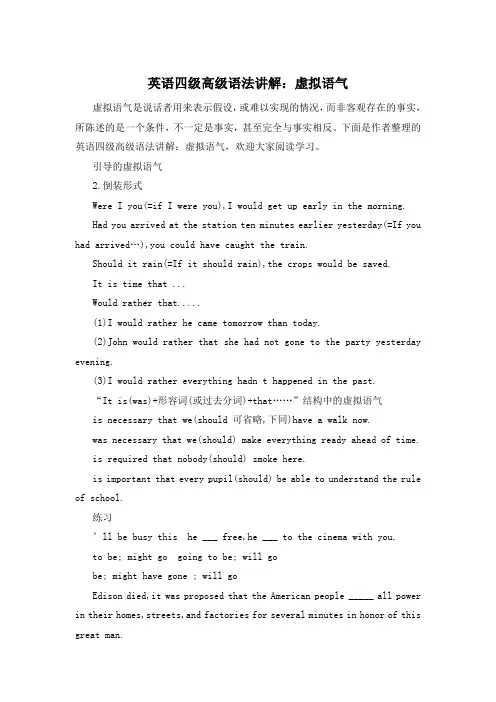
英语四级高级语法讲解:虚拟语气虚拟语气是说话者用来表示假设,或难以实现的情况,而非客观存在的事实,所陈述的是一个条件,不一定是事实,甚至完全与事实相反。
下面是作者整理的英语四级高级语法讲解:虚拟语气,欢迎大家阅读学习。
引导的虚拟语气2.倒装形式Were I you(=if I were you),I would get up early in the morning.Had you arrived at the station ten minutes earlier yesterday(=If you had arrived…),you could have caught the train.Should it rain(=If it should rain),the crops would be saved.It is time that ...Would rather that.....(1)I would rather he came tomorrow than today.(2)John would rather that she had not gone to the party yesterday evening.(3)I would rather everything hadn t happened in the past.“It is(was)+形容词(或过去分词)+that……”结构中的虚拟语气is necessary that we(should 可省略,下同)have a walk now.was necessary that we(should) make everything ready ahead of time.is required that nobody(should) smoke here.is important that every pupil(should) be able to understand the rule of school.练习’ll be busy this he ___ free,he ___ to the cinema with you.to be; might go going to be; will gobe; might have gone ; will goEdison died,it was proposed that the American people _____ all power in their homes,streets,and factories for several minutes in honor of this great man.off offturn off turned offI known her name,_____.does she know mine? where does she live?would have invited her to lunch would be beautiful’d rather you ______ by train,because I cant bear the idea of your being in an airplane in such bad weather.go gogonevictim ________(本来会有机会活下来) if he had been taken to hospital in time.would have a chance to survive(翻译)professor required that ________(我们交研究报告)。
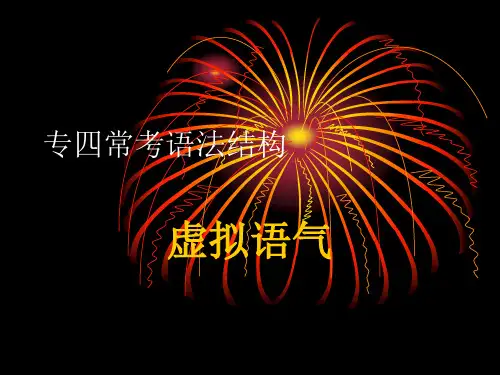
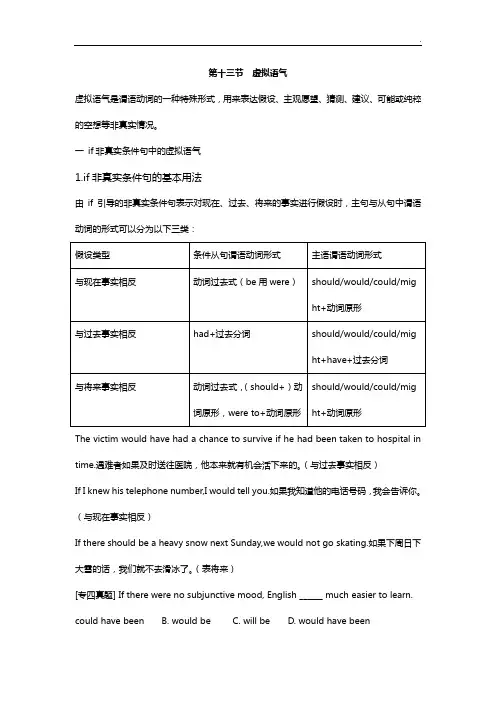
第十三节虚拟语气虚拟语气是谓语动词的一种特殊形式,用来表达假设、主观愿望、猜测、建议、可能或纯粹的空想等非真实情况。
一if非真实条件句中的虚拟语气1.if非真实条件句的基本用法由if引导的非真实条件句表示对现在、过去、将来的事实进行假设时,主句与从句中谓语动词的形式可以分为以下三类:The victim would have had a chance to survive if he had been taken to hospital in time.遇难者如果及时送往医院,他本来就有机会活下来的。
(与过去事实相反)If I knew his telephone number,I would tell you.如果我知道他的电话号码,我会告诉你。
(与现在事实相反)If there should be a heavy snow next Sunday,we would not go skating.如果下周日下大雪的话,我们就不去滑冰了。
(表将来)[专四真题] If there were no subjunctive mood, English ______ much easier to learn. could have been B. would be C. will be D. would have been译文:如果没有虚拟语气,英语学习起来就会更容易了。
分析:本题表示与现在事实相反的假设。
表现与现在事实相反,条件从句用一般过去时,主句使用should(would)+动词原形,故B为答案。
A项could have been 是对过去事实的假设,与从句所表示的现在事实不吻合;C项will be 不可以用于虚拟语气中;D 是与过去事实相反的假设的虚拟语气从句形式。
2.省略if的虚拟条件句的用法在虚拟条件句中,如果从句中含有were, had或should等词时,可将if省去,把were, had或should等提到主句之前,引起倒装。
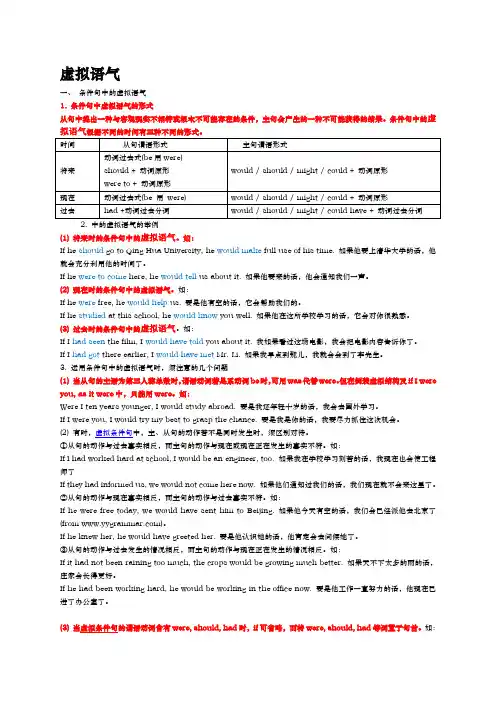
虚拟语气一、条件句中的虚拟语气1. 条件句中虚拟语气的形式从句中提出一种与客观现实不相符或根本不可能存在的条件,主句会产生的一种不可能获得的结果。
条件句中的虚拟语气根据不同的时间有三种不同的形式。
时间从句谓语形式主句谓语形式将来动词过去式(be用were)should + 动词原形were to + 动词原形would / should / might / could + 动词原形现在动词过去式(be 用were) would / should / might / could + 动词原形过去had +动词过去分词would / should / might / could have + 动词过去分词2. 中的虚拟语气的举例(1) 将来时的条件句中的虚拟语气。
如:If he should go to Qing Hua University, he would make full use of his time. 如果他要上清华大学的话,他就会充分利用他的时间了。
If he were to come here, he would tell us about it. 如果他要来的话,他会通知我们一声。
(2) 现在时的条件句中的虚拟语气。
如:If he were free, he would help us. 要是他有空的话,它会帮助我们的。
If he studied at this school, he would know you well. 如果他在这所学校学习的话,它会对你很熟悉。
(3) 过去时的条件句中的虚拟语气。
如:If I had seen the film, I would have told you about it. 我如果看过这场电影,我会把电影内容告诉你了。
If I had got there earlier, I would have met Mr. Li. 如果我早点到那儿,我就会会到了李先生。
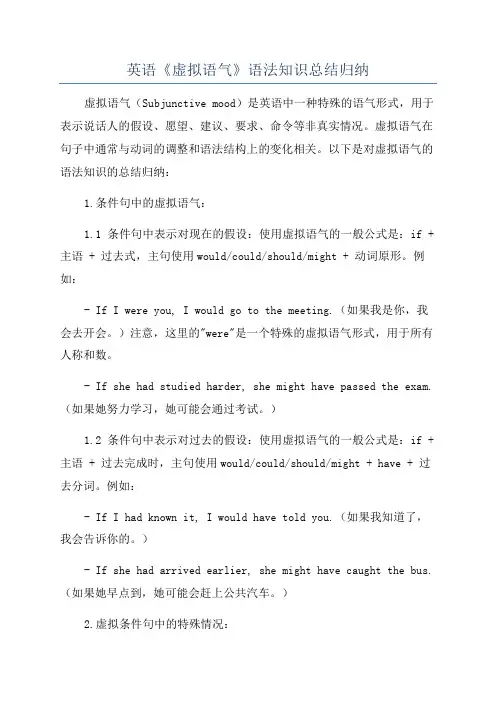
英语《虚拟语气》语法知识总结归纳虚拟语气(Subjunctive mood)是英语中一种特殊的语气形式,用于表示说话人的假设、愿望、建议、要求、命令等非真实情况。
虚拟语气在句子中通常与动词的调整和语法结构上的变化相关。
以下是对虚拟语气的语法知识的总结归纳:1.条件句中的虚拟语气:1.1 条件句中表示对现在的假设:使用虚拟语气的一般公式是:if + 主语 + 过去式,主句使用would/could/should/might + 动词原形。
例如:- If I were you, I would go to the meeting.(如果我是你,我会去开会。
)注意,这里的"were"是一个特殊的虚拟语气形式,用于所有人称和数。
- If she had studied harder, she might have passed the exam.(如果她努力学习,她可能会通过考试。
)1.2 条件句中表示对过去的假设:使用虚拟语气的一般公式是:if + 主语 + 过去完成时,主句使用would/could/should/might + have + 过去分词。
例如:- If I had known it, I would have told you.(如果我知道了,我会告诉你的。
)- If she had arrived earlier, she might have caught the bus.(如果她早点到,她可能会赶上公共汽车。
)2.虚拟条件句中的特殊情况:2.1 在虚拟条件句中表示命令、建议时,主句中的动词可以使用动词原形(而不是would/could/should/might + 动词原形)。
例如:- If you have any questions, please let me know.(如果你有任何问题,请告诉我。
)- If I were you, I would take a break.(如果我是你,我会休息一下。
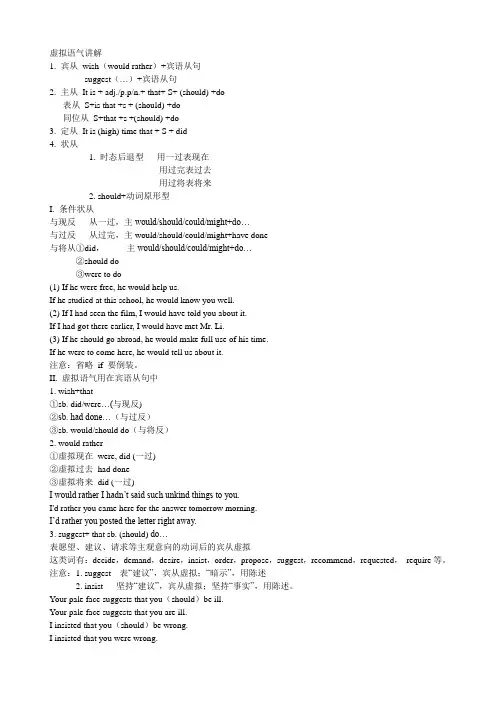
虚拟语气讲解1. 宾从wish(would rather)+宾语从句suggest(…)+宾语从句2. 主从It is + adj./p.p/n.+ that+ S+ (should) +do表从S+is that +s + (should) +do同位从S+that +s +(should) +do3. 定从It is (high) time that + S + did4. 状从1. 时态后退型用一过表现在用过完表过去用过将表将来2. should+动词原形型I. 条件状从与现反从一过,主would/should/could/might+do…与过反从过完,主would/should/could/might+have done与将从①did,主would/should/could/might+do…②should do③were to do(1) If he were free, he would help us.If he studied at this school, he would know you well.(2) If I had seen the film, I would have told you about it.If I had got there earlier, I would have met Mr. Li.(3) If he should go abroad, he would make full use of his time.If he were to come here, he would tell us about it.注意:省略if 要倒装。
II. 虚拟语气用在宾语从句中1. wish+that①sb. did/were…(与现反)②sb. had done…(与过反)③sb. would/should do(与将反)2. would rather①虚拟现在were, did (一过)②虚拟过去had done③虚拟将来did (一过)I would rather I hadn’t said such unkind things to you.I'd rather you came here for the answer tomorrow morning.I’d rather you posted the letter right away.3. suggest+ that sb. (should) do…表愿望、建议、请求等主观意向的动词后的宾从虚拟这类词有:decide,demand,desire,insist,order,propose,suggest,recommend,requested,require等。
英语虚拟语气知识点总结一、虚拟语气的概念:虚拟语气,是指表示说话者所说的情况并非现实或已经发生,或在说话时还不确定是否实现的一种语态。
其特点是句子中的动词形式属于虚拟语气。
二、虚拟语气的表达:1. 条件虚拟语气:表示与现在或未来事实相反的虚拟情况。
(1)主句用过去时,从句用过去完成时。
If I had known the truth, I would not have believed him.(如果我知道了真相,我就不会相信他了。
)(2)主句用过去式,从句用“had+过去分词”。
If he had worked harder, he would have passed the exam.(如果他更加努力学习的话,他就能够通过这个考试。
)2. 虚拟假设语气:表示想像中与现在或将来相反的事情。
(1)主句用过去时,从句用过去式。
If I knew his address, I would go there and see him now.(如果我知道他的地址的话,我现在就会去找他了。
)(2)主句用were,表示与过去的虚拟情况相反。
If I were you, I would study hard.(如果我是你的话,我会好好学习。
)3. 祝愿虚拟语气:表示转化为现实的愿望。
(1)主句用过去式,从句用过去完成式。
I wish I had known him earlier.(我希望我更早认识他。
)(2)主句用过去式,从句用would / could +动词原形。
I wish he could help me with my English.(我希望他能够帮助我学习英语。
)4. 建议虚拟语气:表示对假设的结果的建议。
If I were you, I would work harder.(如果我是你的话,我会更加努力工作。
)5. 明确表示否定的虚拟语气:If they didn’t arrive on time, they would miss the plane.(如果他们没按时到达,他们将会错过飞机。
1.条件句的虚拟(if)比如:(1) 与过去事实相反If I had seen the film, I would have told you about it.(2) 与现在事实相反If he were free, he would help us.要是他有空的话,它会帮助我们的。
(3). 与将来事实相反If he were to come here, he would tell us about it.如果他要来的话,他会通知我们一声。
If he studied at this school, he would know you well.如果他在这所学校学习的话,它会对你很熟悉。
注意省略if的倒装形式,比如:If I had studied hard, I would have passed the exam.Had I studied hard, I would have passed the exam.2. 一些表示请求、要求、命令或建议等意义的动词所接的宾语从句advise, ask, demand, desire, decide, insist, order, propose, request, sugge st其虚拟语气的结构为:(should) + 原形动词。
如:The teacher advised that we should make good use of every minute her 老师劝我们要好好地利用在这儿的每一分钟。
The Party asked that we should serve the people with our heart and soul 党要求我们要全心全意地为人民服务注意suggest和insist这两个词,当insist的意思为:坚决认为,坚持说;suggest的意思为:表明,暗含,暗示等时,宾语从句不用虚拟语气。
如:Tom insisted that he hadn’t stolen the watch.汤姆坚持说他没有偷那块手表。
语法考点之一:虚拟语气考点1. If从句中的虚拟语气1、与过去事实相反:从句sb had done,主句sb would(should, could, might)+ have done;2、省略if,从句的语序用到装,即将were, had或should移至主语的前面,但否定词not不前移。
3、与将来事实相反:从句sb did (should+do或were+to do),主句sb would (should, could, might)+do。
4、错综条件句:主句与从句的动作发生在不同的时间段。
比如:从句对过去虚拟,而主句对现在虚拟,即从句sb had done,主句sb would(should, could, might)+do;考点2:表示建议、要求、命令等动词如insist, order, command, suggest, advise, propose, ask, require, request, demand引导的从句和it引导的相应的分词、名词和形容词从句,谓语用(should)+动词原形。
考点3:It is +advisable, essential, important, imperative, incredible等从句,谓语用(should)+动词原形。
考点4:it is (high/about) time that的结构中,从句使用一般过去式。
例如:考点5:much as"尽管,虽然"引导让步状语从句,从句中用would have done表示假设。
考点6:if only, wish, as if/as though引导从句,与过去事实相反:had + done;与现在事实相反:动词过去式;与将来事实相反:could/would + do考点7:would rather/sooner从句中使用一般过去式或过去完成式分别表示对现在或过去的虚拟考点8:lest / for fear that+(should ) +原形动词。
专四语法(虚拟语气)虚拟语气用来表示说话人的主观愿望或假想,所说的是一个条件,不一定是事实,或与事实相反。
条件句可分为两类,一类为真实条件句,一类为非真实条件句。
非真实条件句表示的是假设的或实际可能性不大的情况,故采用虚拟语气。
eg. If he comes, he will bring his violin.典型例题The volleyball match will be put off if it ___.A.will rainB. rainsC. rainedD. is rained答案B。
真实条件句主句为将来时,从句用一般现在时。
注意:1)在真实条件句中,主句不能用be going to表示将来,该用shall, will. (错) If you leave now, you are never going to regret it.(对) If you leave now, you will never regret it.2)表示真理时,主句谓语动词便不用shall (will) +动词原形,而直接用一般现在时的动词形式。
从句中提出一种与客观现实不相符或根本不可能存在的条件,主句会产生的一种不可能获得的结果。
条件句中的虚拟语气根据不同的时间有三种不同的形⏹If I had time, I would do it again.⏹If I had known of your arrival, I should have met you at the station.⏹If she had further considered the problem, she might have come to the correctconclusion.真题举例:1. All of us would have enjoyed the party much more if there _____ quite such a crowd people there.(00, 49)[C]A. weren’tB. hasn’t beenC. hadn’t beenD. w ouldn’t be2. If your car _____ during the first 12 months,take it to an authorized dealer.(98, 43)[B]A. shall needB. should needC. would needD. will need3. If there were no subjunctive mood, English _____ much easier to learn.(09, 52) [B]A. could have beenB. would beC. will beD. would have been4. _____ for the fact that she broke her leg, she might have passed the exam.(02, 60)[A]A. Had it not beenB. Hadn’t it beenC. Was it notD. Were it not5. If you explained the situation to your solicitor, he _____ able to advise you much better than I can. (05, 51) [A]A. would beB. will have beenC. wasD. were6. I was to have made a speech if _____. (97, 51) [C]A. I was not called awayB. nobody would have called me awayC. I had not been called awayD. nobody called me away当条件状语从句表示的行为和主句表示的行为所发生的时间不一致时,被称为:错综时间条件句,动词的形式要根据它所表示的时间做出相应的调整。
⏹Had it not been for the timely investment from the general public, ourcompany would not be so thriving as it is.⏹(主句与现在事实相反,从句与过去事实相反)⏹Had Paul received six more votes in the last election, he would be ourchairman now.⏹(主句与现在事实相反,从句与过去事实相反)真题举例:1. Had Judy been more careful on the maths exam, she _____ much better results now. (08, 52) [D]A. would be gettingB. could have gotC. must getD. would get2. _____ if I had arrived yesterday without letting you know beforehand ?(04,54) [A]A. Would you be surprisedB. Were you surprisedC. Had you been surprisedD. Would you have been surprised⏹Your math instructor would have been happy to give you a make-upexamination had you gone and explained that your parents were ill at the time.(句子前半部分为假设情况,而“父母病了”是事实)⏹ I would have gone to visit him in the hospital had it been at all possible, but Iwas fully occupied the whole of last week.(前半部分为假设,后半部分是事实)真题举例:1. He would have finished his college education, but he _____ to quit and find ajob to support his family. (07, 60)[C]A. had hadB. hasC. hadD. would have2. _____ you ____ further problems with your printer, contact your dealer foradvice. (05, 63) [C]A. If, hadB. Have, hadC. Should, haveD. In case, had3. If your car _____ any attention during the first 12 months, take it to anauthorized dealer. (98, 43 ) [B]A. shall needB. should needC. would needD. will need有时句中并未出现条件句,其假设情况是由上下文含蓄地提供的,这种句子称为含蓄条件句。
eg. A more careful student wouldn’t have made such glaring mistakes.With his aid you would have succeeded in it.But for the rain, we should have had a pleasant journey.She must have been ill, otherwise she would have come to school.⏹(1) 连词but, but that, or, or else;副词otherwise, unfortunately等表示转折假设。
如:⏹ A safety analysis would have identified the target as a potential danger.Unfortunately, it was never done.⏹Victor obviously doesn’t know what’s happened; o therwise he wouldn’t havemade such a stupid remark.⏹I used my calculator; otherwise I’d have taken much longer.⏹(2)介词短语暗含假设条件,常用的有:without, but for, under more favorableconditions等。
如:⏹But for your timely advice, I would never have known how to go about thework.(94年)⏹The storm delayed us. But for the storm we would have been in time.⏹Supposing I accepted this offer, what would you say?⏹Without your timely help, my daughter would have drowned.⏹(3)intended/meant/hoped/wished/planned 或was/were +不定式完成式或had intended / meant / planned / hoped / wished +不定式一般式暗示虚拟语气。
⏹如:I intended to have called on you, but I was busy at that time.⏹(4)情态动词完成式暗示虚拟语气。
如:⏹I should have called to make an airline reservation, but I didn’t.真题举例:1. You ___ Jim anything about it. It was none of his business. (00, 48) [A]A. needn’t have toldB. needn’t tellC. mustn’t have toldD. mustn’t tell2. Aren't you tired? I ____ you had done enough for today. (09,61) [A]A. should have thoughtB. must have thoughtC. might have thoughtD. could have thought3. You _____ Mark anything. It was none of his business. (98, 52) [A]A. needn’t have toldB. needn’t tellC. mustn’t have toldD. mustn’t tell虚拟条件句的从句部分如果含有were, should, 或had, 可将if省略,再把were, should或had 移到从句句首,实行倒装。